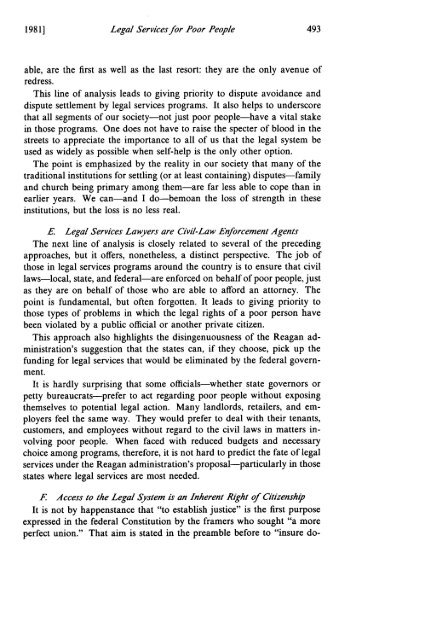Law for The Poor
Law for The Poor
Law for The Poor
You also want an ePaper? Increase the reach of your titles
YUMPU automatically turns print PDFs into web optimized ePapers that Google loves.
1981]<br />
Legal Services <strong>for</strong> <strong>Poor</strong> People<br />
able, are the first as well as the last resort: they are the only avenue of<br />
redress.<br />
This line of analysis leads to giving priority to dispute avoidance and<br />
dispute settlement by legal services programs. It also helps to underscore<br />
that all segments of our society-not just poor people-have a vital stake<br />
in those programs. One does not have to raise the specter of blood in the<br />
streets to appreciate the importance to all of us that the legal system be<br />
used as widely as possible when self-help is the only other option.<br />
<strong>The</strong> point is emphasized by the reality in our society that many of the<br />
traditional institutions <strong>for</strong> settling (or at least containing) disputes-family<br />
and church being primary among them-are far less able to cope than in<br />
earlier years. We can-and I do-bemoan the loss of strength in these<br />
institutions, but the loss is no less real.<br />
E. Legal Services <strong>Law</strong>yers are Civil-<strong>Law</strong> En<strong>for</strong>cement Agents<br />
<strong>The</strong> next line of analysis is closely related to several of the preceding<br />
approaches, but it offers, nonetheless, a distinct perspective. <strong>The</strong> job of<br />
those in legal services programs around the country is to ensure that civil<br />
laws-local, state, and federal-are en<strong>for</strong>ced on behalf of poor people, just<br />
as they are on behalf of those who are able to af<strong>for</strong>d an attorney. <strong>The</strong><br />
point is fundamental, but often <strong>for</strong>gotten. It leads to giving priority to<br />
those types of problems in which the legal rights of a poor person have<br />
been violated by a public official or another private citizen.<br />
This approach also highlights the disingenuousness of the Reagan administration's<br />
suggestion that the states can, if they choose, pick up the<br />
funding <strong>for</strong> legal services that would be eliminated by the federal government.<br />
It is hardly surprising that some officials-whether state governors or<br />
petty bureaucrats-prefer to act regarding poor people without exposing<br />
themselves to potential legal action. Many landlords, retailers, and employers<br />
feel the same way. <strong>The</strong>y would prefer to deal with their tenants,<br />
customers, and employees without regard to the civil laws in matters involving<br />
poor people. When faced with reduced budgets and necessary<br />
choice among programs, there<strong>for</strong>e, it is not hard to predict the fate of legal<br />
services under the Reagan administration's proposal-particularly in those<br />
states where legal services are most needed.<br />
F Access to the Legal System is an Inherent Right of Citizenship<br />
It is not by happenstance that "to establish justice" is the first purpose<br />
expressed in the federal Constitution by the framers who sought "a more<br />
perfect union." That aim is stated in the preamble be<strong>for</strong>e to "insure do-

















